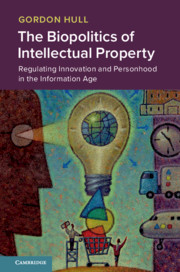 The Biopolitics of Intellectual Property
The Biopolitics of Intellectual Property Published online by Cambridge University Press: 01 November 2019
Patent law is where the messy evolution of intellectual property into neoliberal biopower is most contested.I begin with the emergence of a new model of medicine in genomics and show how that model functions as a form of neoliberal subjectification insofar as it conceptualizes health as a form of risk management.I then turn to litigation surrounding the patentability of isolated gene fragments, which offers a nearly ideal case study of the stakes in how one models the form of power underlying subject-matter patentability, and how patentability encourages the development of neoliberal agents who model their health in terms borrowed from financial risk.I then turn to two other areas where the Supreme Court is pushing back against an expansive notion of patentability: its revival of patent exhaustion doctrine, and a series of decisions on subject-matter patentability.The chapter concludes by studying the Court’s ruling upholding the PTO’s inter partes review process.The administrative state is a key feature of public biopolitics, and the opinion, concurrence, and dissent clearly illustrate what is at stake in the intersection of differing understandings of power and intellectual property law.
To save this book to your Kindle, first ensure [email protected] is added to your Approved Personal Document E-mail List under your Personal Document Settings on the Manage Your Content and Devices page of your Amazon account. Then enter the ‘name’ part of your Kindle email address below. Find out more about saving to your Kindle.
Note you can select to save to either the @free.kindle.com or @kindle.com variations. ‘@free.kindle.com’ emails are free but can only be saved to your device when it is connected to wi-fi. ‘@kindle.com’ emails can be delivered even when you are not connected to wi-fi, but note that service fees apply.
Find out more about the Kindle Personal Document Service.
To save content items to your account, please confirm that you agree to abide by our usage policies. If this is the first time you use this feature, you will be asked to authorise Cambridge Core to connect with your account. Find out more about saving content to Dropbox.
To save content items to your account, please confirm that you agree to abide by our usage policies. If this is the first time you use this feature, you will be asked to authorise Cambridge Core to connect with your account. Find out more about saving content to Google Drive.